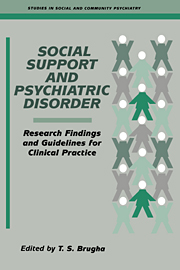Book contents
- Frontmatter
- Contents
- Preface
- List of contributors
- 1 Social support and psychiatric disorder: overview of evidence
- PART I CONCEPTS AND ORIGINS OF SOCIAL SUPPORT
- PART II LESSONS FROM SELECTED OBSERVATIONAL STUDIES
- PART III LESSONS FROM INTERVENTION STUDIES
- PART IV INTERVENTION PRINCIPLES AND RECOMMENDATIONS
- Index
1 - Social support and psychiatric disorder: overview of evidence
Published online by Cambridge University Press: 31 October 2009
- Frontmatter
- Contents
- Preface
- List of contributors
- 1 Social support and psychiatric disorder: overview of evidence
- PART I CONCEPTS AND ORIGINS OF SOCIAL SUPPORT
- PART II LESSONS FROM SELECTED OBSERVATIONAL STUDIES
- PART III LESSONS FROM INTERVENTION STUDIES
- PART IV INTERVENTION PRINCIPLES AND RECOMMENDATIONS
- Index
Summary
Background
There is growing evidence that social support is important for physical and psychological health as well as for survival (House et al., 1988). Unfortunately there have been few experimental studies and hardly any randomised controlled clinical trials to evaluate the effects on illness or survival of enhancing personal social support networks, or of enhancing the ability of such individuals to recruit support more effectively. Therefore, the need for a critical, experimental and evaluative approach to the topic and for a deeper understanding of the technical difficulties involved in doing so needs to be emphasised at this time.
A considerable diversity of research measures and designs have been used to study support–illness associations, making the use of more formal methods for evaluating the current published evidence largely impractical. The reviewer must also be aware of the possibility of biases introduced by the publishing process, which may tend to favour positive findings over ‘non-significant’ ones. Nonetheless, in this introductory chapter, emphasis will be given also to negative studies, many of which may reveal useful lessons for future researchers, and which may be of interest also to practitioners working with clients and patients.
The chapter begins by tracing the origins of the idea of social support within medicine and public health or social medicine. The theoretical background to the subject will then be explored in relation to the psychology and social sciences literature and then in relation to biological models that may also explain underlying mechanisms linking social behaviour and emotional and other states of arousal.
Keywords
- Type
- Chapter
- Information
- Social Support and Psychiatric DisorderResearch Findings and Guidelines for Clinical Practice, pp. 1 - 38Publisher: Cambridge University PressPrint publication year: 1995
- 6
- Cited by



